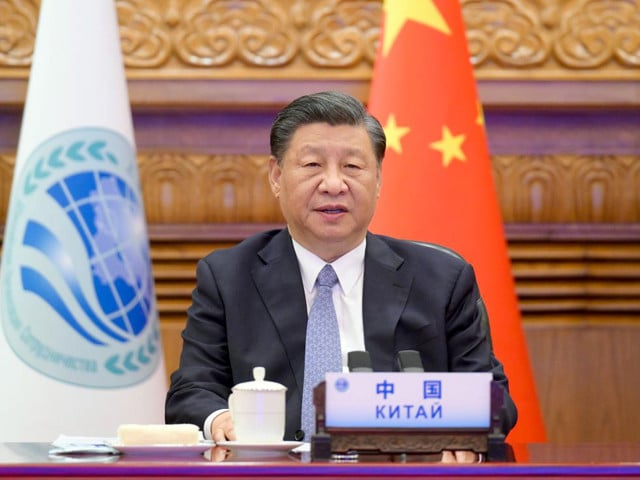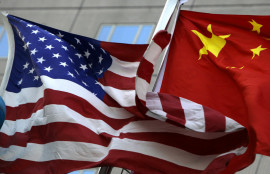
In a significant address on Tuesday, China's President unveiled a comprehensive blueprint for a new global governance system centered around the implementation of Global Development and Security Initiatives.
Delivering a sweeping speech at a summit of the Shanghai Cooperation Organisation (SCO) via video link, President Xi Jinping emphasized the need to collectively protect the security and development interests of the region.
Xi, who has recently been awarded a third five-year term as China's president, called for strategic communication, coordination, and dialogue to bridge differences and replace competition with cooperation.
“We should keep in mind the overall and long-term interests of our region and make our foreign policies independently,” Xi told leaders of the Eurasian security and political group that includes India, Pakistan, Kazakhstan, the Kyrgyz Republic, Russia, Tajikistan, and Uzbekistan.
The Chinese leader stressed that members of the bloc, which now includes Iran, should shun ideological and confrontational approaches to address problems and security challenges. “We must be highly vigilant against external attempts to foment a new Cold War or camp-based confrontation in our region," President Xi cautioned.
Addressing the virtual summit, Xi also offered his veiled assessment against the threat of hegemonism and power politics that Beijing associates with Washington DC. Returning again and again to themes of cooperation, development, and mutual trust, the Chinese leader’s focus remained on delivering a message of unity over division to his audience.
Also read: Pakistan poised to benefit from China-Pakistan S&T cooperation
“China stands ready to work with all sides to implement the Global Development Initiative, keep to the right direction of economic globalization, oppose protectionism, unilateral sanctions, and the overstretching of national security, and reject the moves of setting up barriers, decoupling, and severing supply chains,” Xi said.
Both Xi and his Russian counterpart pushed for switching to a financial system under which trade could be settled in local currencies, a move aimed at minimizing the influence of the US dollar on the region's economy. “China proposes that the SCO scale up local currency settlement between member states, expand cooperation on sovereign digital currency, and promote the establishment of an SCO development bank,” Xi told members of the Eurasian bloc.
Commenting on President Xi’s speech, Dr. Talat Wizarat, a Karachi-based foreign policy expert, said, “The existing world order is based on promoting conflict and arms trade. And, you know, that was actually implemented and forced by Western nations, the United States, and others. In his address, Xi is proposing an alternative to that. An alternative that rests on the idea of mutual development, peace, and security.”
“There is a lot of stress on connectivity. There is a lot of stress on inclusiveness in what Xi said before the SCO leaders,” said Wizarat, who has recently authored a book on Beijing's Belt and Road Initiative, the cornerstone of President Xi Jinping's foreign policy.
During his speech, Xi also warned against a number of nontraditional security challenges, including digital, biological, and space. “We should move faster to strengthen the mechanisms for our law enforcement and security cooperation and expand cooperation in the nontraditional security fields.”
Also read: US expects more cooperation with India in South China Sea
“The mere mention of security, an area that the United States claims to dominate, is a challenge to its order. Xi is effectively trying to rally leaders on the security theme and he will be able to bring nations together,” predicted Dr. Wizarat, former chairperson of the Department of International Relations at the University of Karachi.
On Xi’s development proposal, Wizarat said, "China's big-ticket infrastructure development programs, such as the Belt and Road Initiative (BRI), are pulling many into Beijing's orbit. It's a model that offers development opportunities, and many developing countries are now prioritizing their national and economic interests. Hence, they naturally gravitate to Beijing’s proposed development model."
China's evolving presence, Wizarat explained, is based as much on investment in building social and human capital as it is on giant infrastructure projects.
"You can't blame China for creating a debt trap. More and more countries are trapped in a vicious financial cycle of borrowing from Western lenders, such as the Washington-based International Monetary Fund," Wizarat claimed, referring to a study she conducted on international lenders.
Regarding Washington’s reaction to the Chinese leader’s address, Wizarat said, "Xi’s comments will be viewed with a great deal of suspicion, doubt and even more." She said America needed to come out of the Cold War mentality and learn to work with China, not against it.



1731916090-0/sabrina-(3)1731916090-0-165x106.webp)

















COMMENTS (8)
Comments are moderated and generally will be posted if they are on-topic and not abusive.
For more information, please see our Comments FAQ